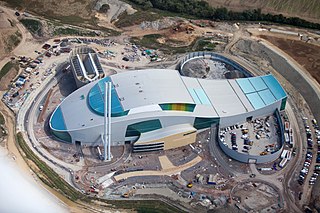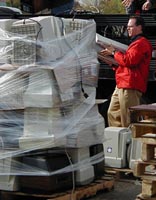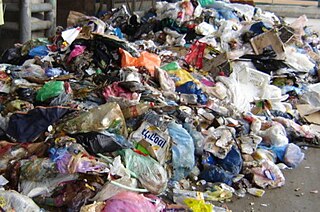
Waste management or waste disposal includes the processes and actions required to manage waste from its inception to its final disposal. This includes the collection, transport, treatment, and disposal of waste, together with monitoring and regulation of the waste management process and waste-related laws, technologies, and economic mechanisms.

A landfill is a site for the disposal of waste materials. It is the oldest and most common form of waste disposal, although the systematic burial of waste with daily, intermediate and final covers only began in the 1940s. In the past, waste was simply left in piles or thrown into pits.

Viridor Limited is a recycling, renewable energy and waste management company in the United Kingdom owned by KKR.

Electronic waste recycling, electronics recycling, or e-waste recycling is the disassembly and separation of components and raw materials of waste electronics; when referring to specific types of e-waste, the terms like computer recycling or mobile phone recycling may be used. Like other waste streams, reuse, donation, and repair are common sustainable ways to dispose of IT waste.

Municipal solid waste (MSW), commonly known as trash or garbage in the United States and rubbish in Britain, is a waste type consisting of everyday items that are discarded by the public. "Garbage" can also refer specifically to food waste, as in a garbage disposal; the two are sometimes collected separately. In the European Union, the semantic definition is 'mixed municipal waste,' given waste code 20 03 01 in the European Waste Catalog. Although the waste may originate from a number of sources that has nothing to do with a municipality, the traditional role of municipalities in collecting and managing these kinds of waste have produced the particular etymology 'municipal.'

Waste Management, Inc., doing business as WM, is a waste management, comprehensive waste, and environmental services company operating in North America. Founded in 1968, the company is headquartered in the Bank of America Tower in Houston, Texas.
The Solid Waste Authority of Central Ohio (SWACO) was established by the Ohio General Assembly in 1989 as part of Ohio House Bill 592, which created Ohio’s current solid waste management planning and regulatory programs. SWACO is a government-run entity responsible for the safe and sanitary management of all solid waste within its district. In this role, it operates the Franklin County Sanitary Landfill, as well as two transfer facilities, all for the benefit of Franklin County, Ohio, and parts of surrounding counties in central Ohio.
A landfill tax or levy is a form of tax that is applied in some countries to increase the cost of landfill. The tax is typically levied in units of currency per unit of weight or volume. The tax is in addition to the overall cost of landfill and forms a proportion of the gate fee.
There is no national law in the United States that mandates recycling. State and local governments often introduce their own recycling requirements. In 2014, the recycling/composting rate for municipal solid waste in the U.S. was 34.6%. A number of U.S. states, including California, Connecticut, Delaware, Hawaii, Iowa, Maine, Massachusetts, Michigan, New York, Oregon, and Vermont have passed laws that establish deposits or refund values on beverage containers while other jurisdictions rely on recycling goals or landfill bans of recyclable materials.
Dean L. Buntrock is an American businessman and philanthropist most well known for his founding and longtime leadership of Waste Management, Inc., North America's largest waste services company. Over his 40-year career he increased revenue from $1 million to $9 billion.
Casella Waste Systems, Inc. is a waste management company based in Rutland, Vermont, United States. Founded in 1975 with a single truck, Casella is a regional, vertically integrated solid waste services company. Casella provides resource management expertise and services to residential, commercial, municipal and industrial customers, primarily in the areas of solid waste collection and disposal, transfer, recycling and organics services. The company provides integrated solid waste services in seven northeastern states: Vermont, New Hampshire, New York, Massachusetts, Connecticut, Maine and Pennsylvania, with its headquarters located in Rutland, Vermont. Casella manages solid waste operations on a geographic basis through two regional operating segments, the Eastern and Western regions, each of which provides a full range of solid waste services, and larger-scale recycling and commodity brokerage operations. Organics services, major account and industrial services, are also provided.

Household hazardous waste (HHW) was a term coined by Dave Galvin from Seattle, Washington in 1982 as part of the fulfillment of a US EPA grant. This new term was reflective of the recent passage of the Resource Conservation and Recovery Act of 1976 in the US. This act and subsequent regulations strengthened the environmental protection requirements for landfills, in Subpart D, and created a "cradle to grave" management system for hazardous wastes, in Subpart C. From RCRA 1976 the US EPA promulgated rules in 1980 which explicitly excluded any wastes from household origins from regulation as a hazardous waste at the federal level. Most US states adopted parallel regulations to RCRA 1976 but were allowed to be more stringent. California took advantage of this allowance and chose to not exempt household origin wastes from their state hazardous waste laws. HHW products exhibit many of the same dangerous characteristics as fully regulated hazardous waste which are their potential for reactivity, ignitability, corrosivity, toxicity, or persistence. Examples include drain cleaners, oil paint, motor oil, antifreeze, fuel, poisons, pesticides, herbicides and rodenticides, fluorescent lamps, lamp ballasts containing PCBs, some smoke detectors, and in some states, consumer electronics. Except for California, most states exclude HHW from their hazardous waste regulations and regulate the management of HHW largely under their solid waste regulatory schemes.

Republic Services, Inc. is a North American waste disposal company whose services include non-hazardous solid waste collection, waste transfer, waste disposal, recycling, and energy services. It is the second largest provider of waste disposal in the United States after Waste Management.
The California Department of Resources Recycling and Recovery is a branch of the California Environmental Protection Agency that oversees the state's waste management, recycling, and waste reduction programs. CalRecycle was established in 2010 to replace the California Integrated Waste Management Board. It is known for administering the California Redemption Value (CRV) program, among other responsibilities.

Waste are unwanted or unusable materials. Waste is any substance discarded after primary use, or is worthless, defective and of no use. A by-product, by contrast is a joint product of relatively minor economic value. A waste product may become a by-product, joint product or resource through an invention that raises a waste product's value above zero.

Electronic waste or e-waste in the United States refers to electronic products that have reached the end of their operable lives, and the United States is beginning to address its waste problems with regulations at a state and federal level. Used electronics are the quickest-growing source of waste and can have serious health impacts. The United States is the world leader in producing the most e-waste, followed closely by China; both countries domestically recycle and export e-waste. Only recently has the United States begun to make an effort to start regulating where e-waste goes and how it is disposed of. There is also an economic factor that has an effect on where and how e-waste is disposed of. Electronics are the primary users of precious and special metals, retrieving those metals from electronics can be viewed as important as raw metals may become more scarce

The National Waste & Recycling Association (NWRA) is a Washington, D.C.-based trade association that represents private waste and recycling companies, as well as manufacturers and distributors of equipment that processes the material, and service providers who serve those businesses. Its nearly 700 members are a mix of publicly traded and privately owned local, regional and Fortune 500 national and international companies. The industry's publicly traded companies are among the largest components of the Dow Jones U.S. Waste & Disposal Index (DJUSPC). NWRA represents approximately 70 percent of the private sector waste and recycling market.

The Solid Waste Disposal Act (SWDA) is an act passed by the United States Congress in 1965. The United States Environmental Protection Agency described the Act as "the first federal effort to improve waste disposal technology". After the Second Industrial Revolution, expanding industrial and commercial activity across the nation, accompanied by increasing consumer demand for goods and services, led to an increase in solid waste generation by all sectors of the economy. The act established a framework for states to better control solid waste disposal and set minimum safety requirements for landfills. In 1976 Congress determined that the provisions of SWDA were insufficient to properly manage the nation's waste and enacted the Resource Conservation and Recovery Act (RCRA). Congress passed additional major amendments to SWDA in the Hazardous and Solid Waste Amendments of 1984 (HSWA).
The Newby Island Landfill (NISL) is one of the largest active landfills on the shores of the San Francisco Bay. It is located in Santa Clara County, California in the United States. The site is located within the city limits of San Jose, California at the western terminus of Dixon Landing Road. The address is 1601 Dixon Landing Road, Milpitas. Although the address and public street access to the site are both in the City of Milpitas, the landfill property is entirely within the City of San Jose. Newby Island Landfill has a length of 5.07 km (3.15 mi). It is located West of the City of Milpitas near Dixon Landing Road and Interstate 880. It is the terminus for waste for all of San Jose (62%), Santa Clara (14%), Milpitas (10%), Cupertino (5%), Los Altos (2%) and other cities (7%). The 342-acre pile is currently permitted to operate until 2041 and may extend up to 245 feet. The landfill is an island surrounded by a levee which keeps its runoff from directly entering the bay, and the water that drains from it is treated in the landfill's own treatment plant. Electricity for the landfill is generated by burning the methane collected from the decomposition of the waste. Dried sewage sludge from the nearby San José–Santa Clara Regional Wastewater Facility is the material used as cover, mixed in with the trash, blending San Jose's waste streams. It is operated by Republic Services (Republic), which, along with Waste Management Incorporated, transports and disposes of most of the household trash in the United States.

Winters Bros. is a privately held waste disposal business in the Northeast United States. Its headquarters are in West Babylon, New York; it currently serves the market of New York, but previously also served Connecticut, Florida and Vermont. It sells its recovered products worldwide. It is the largest waste management firm in Long Island. The firm has six recycling centers and twelve transfer stations.












